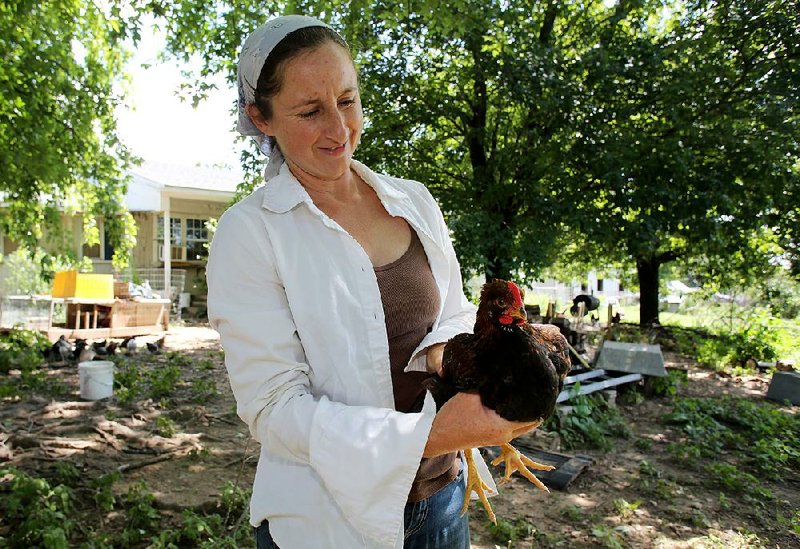Saturday mornings find Kim Kapity patiently waiting at the Fayetteville Farmers Market -- wearing sunglasses, a bandanna, a name tag on a rolled-up-sleeves, button-down shirt, and sweating in the summer heat.
Curious children approach her produce stand. Many have never seen the kinds of eggs she sells.
The chalkboard propped against her umbrella says her goose, duck and chicken eggs are from local pasture-raised heritage breeds that are fed soy-free grains that have not been genetically modified. She says she doesn't use pesticides or herbicides either.
At a glance, they look like ordinary eggs.
But some customers know better. Her regulars know that the products aren't U.S. Department of Agriculture-certified organic, but they meet most of the requirements to be so. Kapity just doesn't pay the $1,500 certification fee.
Her products serve a niche market in Northwest Arkansas. Some people who are allergic to chicken eggs, say they are able to eat duck or goose eggs with no ill effects.
Some people think they can find the eggs she sells somewhere else.
"The first thing out of their mouth is 'I can get this cheaper at Wal-Mart,'" she said. "And I have to slyly say 'no, it's a different product.'"
Kapity, owner and operator of Sycamore Valley Farms in Lincoln in Washington County has been farming as a hobby most her life -- full time since 2009.
It's been a challenge. To turn a profit, most small farmers must compete with grocery retailers and farmers market vendors.
U.S. retail prices for a dozen eggs are at a record low this summer, which is hard on large- and small-scale egg suppliers. One Northwest Arkansas economist said he's seen chicken egg prices as low as 65 cents a dozen recently. Some Wal-Mart stores in Arkansas recently listed a dozen large Best Choice eggs for 48 cents.
Hongwei Xin, director of the Egg Industry Center at Iowa State University, said current egg production costs are higher than retail prices, and that's hitting egg producers hard.
Kapity's prices for a dozen chicken or duck eggs are nearly five times the lowest retail prices. But her prices are similar to or a few cents cheaper than what other free-range egg sellers charge.
Overall, Kapity said she hasn't noticed a dramatic drop in the demand for eggs this year, but last year it was noticeable.
"It happened right after the new Whole Foods opened," she said.
Before full-time farming, she worked as a Northwest Arkansas area conservation water quality and soil technician for the USDA's National Resources Conservation Service. Her main job was to take soil samples at farms, including a few commercial dairy operations.
On her farm, she now relies on two dairy cows for her milk.
The taste of dairy products and eggs from the farm, is noticeably different from what's mass-distributed, which is why customers continue returning to her stand, she said.
Most of her customers are health-conscious, Kapity said. Some have had bouts with cancer and consequently changed their diets. Older customers have told her that her eggs remind them of what they ate as children.
In 1998, her parents moved to the 60-acre plot, with a garden, a few horses and some hens. Now, Kapity and her husband live on the same land, where she has limited her poultry and produce operations to roughly 5 acres. On the farm, she feeds and oversees about 40 chickens, 75 ducks and 19 geese.
Keeping her company are five Great Pyrenees dogs.
As she does her chores, she brainstorms about ways to diversify her small business.
On average, Kapity wants her poultry to each lay two eggs every 2-3 days. A chicken's laying rate changes with stress and the amount of sunlight exposure. In the winter, her farm's egg production drops. To get through the winter, she relies on selling homemade jams and jellies -- elderberry, orange marmalade, passionfruit, and wild black cherry -- and handmade poultry-feather earrings.
She's satisfied with making a living without compromising her animals' quality of life.
She tried working one summer in a large chicken house. Her job was simple: pick up the dead chicks and place them in a bucket. She remembered, as a 14-year-old, walking through the chicken house, breathing in feather dander and stepping over thousands of broilers. The plan was to work there a few months.
"I only lasted a day."
Small farms, to Kapity, are the bedrock of the world. According to the U.N. Food and Agricultural Organization, small-scale farmers provide 70 percent of the world's food. In the European Union, though, about 90 percent of subsidies and 80 percent of research funding go to support conventional industrial agriculture.
Kapity has had to downsize her farm recently. She said her chicken numbers have dropped from 120 to about 40 because of mites, predators and natural causes. Her garden -- once filled with collards, onions, tomatoes, melons, okra and herbs -- was wiped out by herbicide runoff from her neighbor's farm. So, she has taken on a second job. She works at a farm in Prairie Grove to help pay her bills.
SundayMonday Business on 07/16/2017


